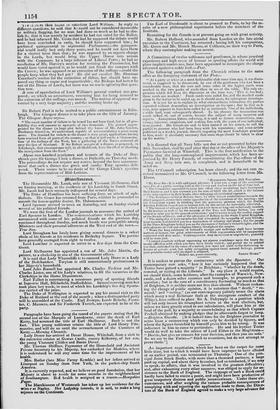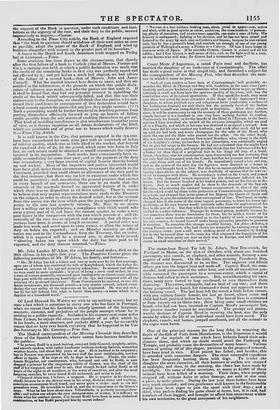Art important negotiation, which has been on the carpet for
some little time, but to which it would have been improper to have alluded at an earlier period, was terminated on Thursday. One of the prin- cipal Joint Stock Banks, with more than a thousand partners, a large paid-up capital, and above thirty branches, had so conducted, if we may so speak, its affairs, that it was involved in the greatest difficulties; and, after exhausting every other resource, was obliged to apply for as- sistance to the Bank of England. The stoppage of such a Bank could hardly have failed to excite a panic, and might have been productive of great temporary distress and public inconvenience. Under these cir- cumstances, and after weighing the various probable consequences of complying with and rejecting the application made to them, the Direc- tors of the Bank of England agreed to make a very large advance for the support of the Bank in question, under such conditions and limi- tations as the urgency of the case, and their duty to the public, seemed imperatively to require.—Courier. According to the Times City article, the Bank of England required that " the bank in question should withdraw all their own notes as soon as possible, adopt the paper of the Bank of England, and wind up business altogether with respect to the greater part of its branches." A house in the Brazil and South American trade stopped on Friday last at Liverpool.— Times. Some attention has been drawn to the circumstance, that shortly after the first failure of a bank in Carlisle (that of Messrs. Forster and Co.), a meeting was held, at which a public declaration was made that the credit of the remaining banks in that city was perfectly sound and not affected by it ; and yet before a week had elapsed, we had advice of the failure of a second bank—that of Messrs. John and James Connell. What the monied interest here desire to know, and they are entitled to the information, is the grounds on which this public decla. ration of solvency was made, and who the parties are that made it. If it shall be found that they had any personal interest in upholding the credit of the bank which subsequently failed, and that this was their inducement to the deception, we should think that the parties who con- tinued their confidence in consequence of that declaration would have a legal remedy against the parties for any loss they might sustain. (???) Such a proceeding would be further beneficial in deterring persons from putting themselves officiously forward to prop up houses of falling credit, possibly from the sole motive of enabling themselves to get out. That kind of meddling interference is also mischievous in another point of view, as it throws suspicion on all future declarations of the kind, which are justifiable and of great use to houses which really deserve it.— Times City Article.
It is well known in the City, that persons engaged in the tea-tree have been encumbered for some time past with an overstock of bohea of inferior quality, which was so little liked in the market, that beyond the equalized duty of 2.s. Id. the pound, which came into torte in July last, no such return could be obtained as would remunerate the expense incurred in its importation. Such stocks have consequently been ra- pidly accumulating for some time past ; and as the payment of the duty was compulsory, a very large amount of capital became thereby locked up and useless. Most of the importers and parties interested would have been glad, under these circumstances, to reexport the article to the Continent, provided they could obtain an allowance of the duty paid in the first instance ; but there was no law in existence under which this could be permitted ; and, considering the general pressure that existed in every branch of our commerce, there can be no doubt that this situation of the tea-trade formed an aggravated feature of it, under which there was no disposition to sit down quietly. There is reason to believe that very urgent representations were made to the Treasury on the subject, in order to obtain the desired relief; but as the revenue from this source was the item which gave the great appearance of pros- perity to the two last quarterly returns, Mr. Rice by no means lent a willing ear to applications, a compliance with which would take away a great part of it, and leave the current quarter to make a very poor figure in the comparison with the two which precede it : still the necessity of the case was so apparent and so urgent, that all these ob- jections have been, it seems, at length overcome. A partial order was made last week, and acted upon to some extent, to allow the return of duty on bohea tea exported ; and on Monday morning an official notice was sent to the Customhouse from the Treasury, that an order, which it is expected will be a general one, is about to be issued, " allowing bohea tea upon which the duty has been paid to be exported, and the duty thereon returned."—Times.



























 Previous page
Previous page